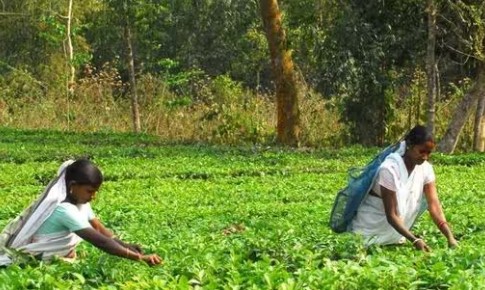Bharat’s tea prices are experiencing a significant increase due to extreme weather conditions, including heatwaves and floods, which have severely impacted production in major tea-producing regions.
This price rise is a potential lifeline for the struggling Indian tea industry, which has been grappling with rising production costs without a corresponding increase in tea prices over the past decade.
“Extreme weather events are hurting tea production. Excessive heat in May, followed by ongoing flooding in Assam, are reducing output,” stated Prabhat Bezboruah, a senior tea planter and former chairman of Bharat’s Tea Board. He also mentioned that production was further affected by the government’s ban on 20 pesticides.
In May, Bharat’s tea production plummeted by over 30 per cent compared to the previous year, dropping to 90.92 million kg – the lowest for that month in more than a decade – due to excessive heat and insufficient rainfall.
Assam, a Northeastern State that produces more than half of Bharat’s tea, has been hit hard, with over 2 million people affected by severe river flooding in July.
Kalyan Sundaram, secretary of the Calcutta Tea Traders’ Association, noted that tea prices began rising after a heatwave reduced production from April amid high demand. By the last week of June, average tea prices surged to 217.53 rupees ($2.61) per kg, marking a nearly 20 per cent increase from the previous year, according to Tea Board data.
While tea production improved in June due to good rainfall, July’s flooding in Assam has once again limited plucking activities in many districts. A Jorhat-based tea planter indicated that July, typically a peak production month, might see a shortfall of 15 to 20 million kg this year.
Bharat produced a record 1.394 billion kg of tea in 2023, but production in 2024 could fall by around 100 million kg, according to Bezboruah. Although the production shortfall is expected to drive prices significantly higher, financially weak and indebted producers are finding it challenging to negotiate with powerful buyers during peak production months, said a Kolkata-based trader.
With more than half of Bharat’s total tea production harvested between July and October, average tea prices in 2024 could be 16 per cent to 20 per cent higher than last year. Despite the price increase, tea exports are unlikely to be affected, as many buyers are increasing their purchases following the pesticide bans, Bezboruah added.
Bharat’s tea exports in the first four months of 2024 surged by 37 per cent compared to the previous year, reaching 92 million kg, according to the Commerce ministry. The country primarily exports the CTC (crush-tear-curl) grade to Egypt and the United Kingdom, while the orthodox variety is shipped to Iraq, Iran, and Russia.

















